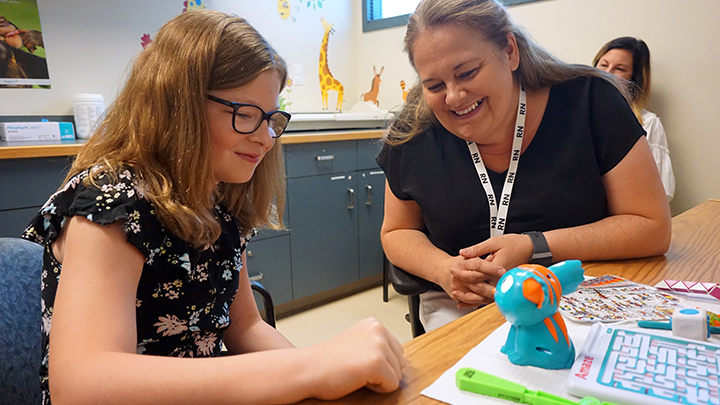
July 4, 2018

Molly McLellan, left, is reunited with Registered Nurse Melanie Burden who helped her overcome her fear of needles during a visit to the WestView Public Health Centre last fall. Molly was worried about getting her needle at school, so her mom brought her to the centre instead. After experiencing some PIE techniques, McLellan’s confidence grew so much that she talked some of her friends into getting their immunizations at school along with her.
Story by Kirsten Goruk | Photo by Vanessa Gomez
STONY PLAIN — Everyone knows kids hate needles, but a new Public Health program in Edmonton Zone helps them overcome their fear and anxiety about immunizations.
The Positive Immunization Experience (PIE) program — launched at WestView Health Centre in late 2016 — aims to make immunizations less painful and nerve-wracking.
Public Health staff pulled together research from within Alberta Health Services (AHS) and other areas to develop education resources and tools for nurses and comfort strategies for families so they can help prepare their children for the needle.
“The biggest challenge that’s been evident since day one is around kids’ perceptions of immunization and their fear of pain,” says Melanie Burden, a registered nurse with the centre in Stony Plain.
“It can become a very negative school experience, which is why we worked and researched to find ways to improve the immunization experience. PIE has been really successful in our schools.”
The techniques introduced at WestView are spreading among nurses in many public health centres and schools across the zone, with the eventual goal of rolling them out across all Edmonton Zone settings.
For babies, strategies to reduce anxiety include breastfeeding during immunization, positioning of the baby and injection technique.
For older kids, toolkits include items such as books, stress balls, bubbles and Etch A Sketches to distract them during immunization. Nurses also use neutral language and breathing techniques, along with family coaching, to prepare kids. Administrative staff also welcome children to put them at ease when they come into the clinics.
Heather McLellan has experienced firsthand how much PIE can help with anxiety. Her daughter, Molly, was so nervous about her Grade 5 immunizations at school that she asked to book an appointment at the WestView Public Health Centre instead.
Their experience gave Molly the confidence to get the rest of her yearly ones at school.
“The nurse was amazing. She explained that she’s the nurse who works at Molly’s school — and that she’ll be there next time to help, if Molly wants to get (her needle) there instead. Molly told all of her friends that it was no big deal, that they could all handle it,” adds McLellan.
WestView alone receives 25,000 clinic visits per year for immunization of babies and children. Within Parkland County schools, every year, nurses do 10,000 immunizations for Grades 1, 5 and 9.
Since 2017, the distraction toolkits used by WestView nurses have been funded by community donations to the Tri-Community Health & Wellness Foundation.
“We were pleased to approve funding for the WestView Public Health PIE program — and we’re keen to provide additional funding this year,” says Brenda Reeve, foundation chair.
Lisa Porret, manager of the WestView Public Health Centre, says she’s incredibly proud of the work done by her team to help train other public health staff across the zone.
“Our goal is for our nurses to use comfort strategies with every patient, every time. We know that many families, who’ve had these experiences at our clinics, are now also seeing their children become more resilient after needles. Our next step is to look at offering PIE during our mass-influenza immunization clinics.”
For McLellan, who says Molly has plans to become a radiologist when she grows up, the program has given her child another positive healthcare experience to remember going forward.
“It’s made a huge difference for her,” adds McLellan. “I could tell that the nurse took the time to make her comfortable; she was funny and kind and made it as fun an experience as she could.”